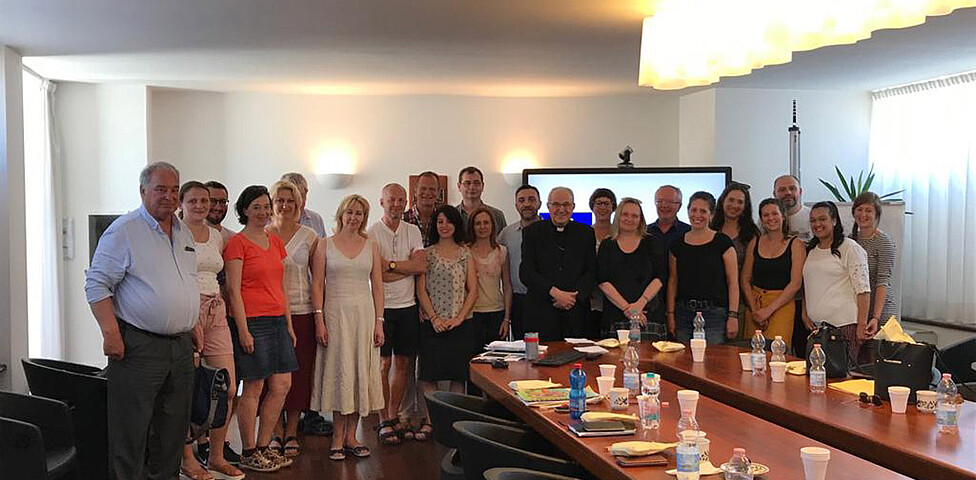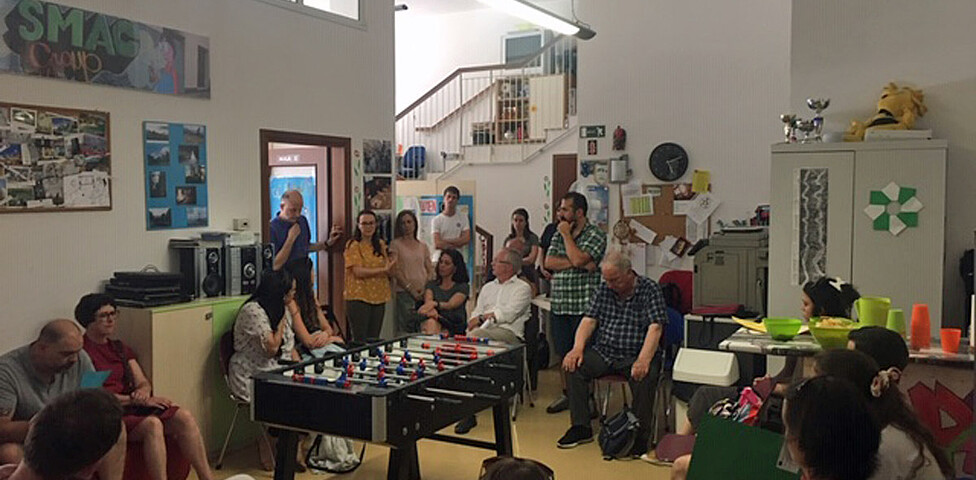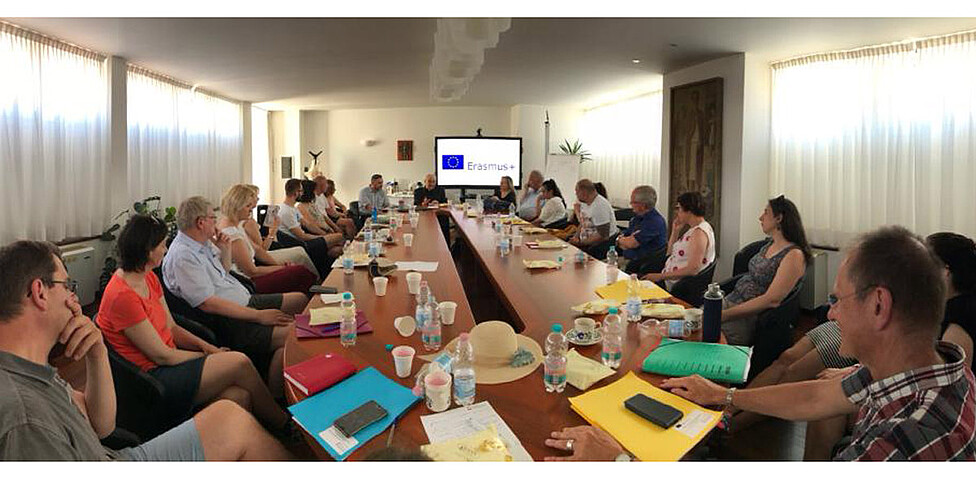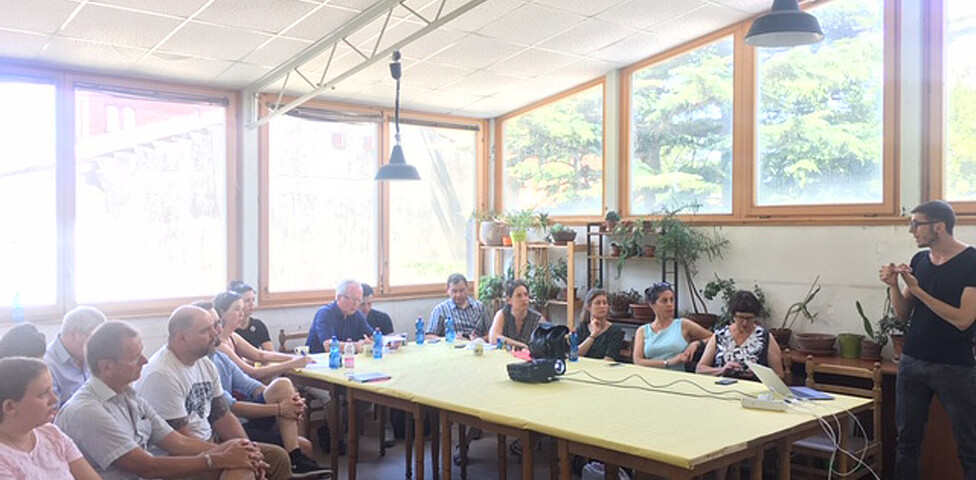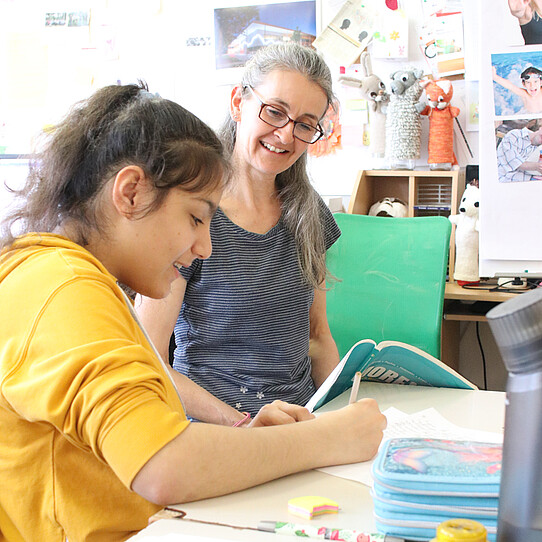5. Meeting Triest (IT) 24. - 25. Juni 2019
Agenda
Reports
An unserem 5. Transnationalen Projekttreffen der strategischen Partnerschaft „Inclusive family education and support in the light of EU2020“ nahmen 23 Fachkräfte von allen sieben Partnerorganisationen aus sechs EU-Mitgliedsstaaten teil. Hinzu kam eine Reihe von italienischen Referentinnen und Referenten, die uns für fachliche Inputs und zur Präsentation zur Verfügung standen.
Der Workshop fand vom 24. bis 26. Juni 2019 in Triest (Italien) statt. Das Treffen wurde ausgerichtet von unserem Partner Fondazione Diocesana Caritas Trieste. Die Anreise der Teilnehmenden erfolgte bereits am Vortag.
Der Workshop startete mit einer Begrüßung durch Marco Aliotta, Leiter des Bereichs Soziale Dienste und Armutsbekämpfung der Caritas Triest. Aliotta führte kurz in die Arbeit mit und die verschiedenen Hilfen für benachteiligte Familien ein und wies insbesondere auf die Bildungsangebote für Familien und deren Kinder hin. Der Schwerpunkt liegt hier in der Förderung von Zugängen zu Bildungsangeboten, welche durch Caritas-Einrichtungen und ihre Kooperationspartner durchgeführt werden.
Im Verlauf des Vormittags wurde uns die Arbeit der Organisation Center for Child Health vorgestellt, die sich für die Rechte von Eltern und ihrer Kinder in Friuli Venezia Giulia stark macht. Im Anschluss präsentierte eine Referentin die Situation der „Bildungsarmut“ in Gesamtitalien im Vergleich zur Lage in Triest. Es wurde deutlich, dass die Entwicklungsmöglichkeiten von Kindern und Jugendlichen abhängig davon sind, ob den Eltern die entsprechenden Zugänge zu Bildungsangeboten vor Ort bekannt sind, und ob sie diese auch nutzen können. Eine Vertreterin der Stadtverwaltung Triest stellte das erfolgreiche Projekt „Social Library for Community Building“ vor. Hier können Menschen aus allen Bildungsschichten und unabhängig vom sozialen Status kostenlos die öffentlichen Bibliotheken nutzen und an speziellen Bildungsangeboten teilnehmen.
Am Nachmittag besuchten wir eine kommunale Einrichtung für schulmüde Jugendliche, die Beratung und Betreuung für Eltern und Jugendliche anbietet. Im Projekt „SMaC-Center for early school leavers“ erfahren Kinder und Jugendliche persönliche Aufmerksamkeit und fachliche Zuwendung. Darüber hinaus erhalten sie in Kleinstgruppen Unterricht, der sie dazu befähigt, den regulären Schulunterricht wieder aufzunehmen und eine Perspektive für ihre berufliche und persönliche Laufbahn zu entwickeln. Eltern erhalten Beratung und Unterstützung bei der Erziehung ihrer Kinder.
Am Dienstag setzten sich weitere Besuche zur speziellen Bildungs- und Beratungsarbeit für Familien, Jugendliche und Kinder fort. Die Organisation Emporio delle Solidarietá stellt im „Sozialen Supermarkt“ armen und einkommensschwachen Familien und Einzelpersonen jeden Alters gespendete Lebensmittel kostengünstig zur Verfügung, erläuterte Omar Vidoni, Verantwortlicher des Projekts. Das 2016 gestartete Projekt „Housing First for Families“ verfügt mittlerweile über 10 Appartements. Im Rahmen eines stufenweisen Prozesses werden Familien ohne Wohnung umfassend sozial beraten und wieder in eine feste Wohnung vermittelt. Durch die regelmäßige und enge Betreuung wird die Teilnahme an Aus- und Weiterbildungsmaßnahmen angestoßen und gefördert. Gleichzeitig werden die notwendigen Voraussetzungen geschaffen, um Familien wieder in die Gesellschaft zu integrieren. Im Anschluss erläuterten zwei Mitarbeiter der Caritas Triest ein Projekt zur Integration von Asyl suchenden Familien und das „Job Inclusion Pathway Programme“.
Am Nachmittag waren wir zu Gast im „Care House La Madre“. Die Direktorin Vera Pellegrino stellte sehr eindrücklich ihre Arbeit zur Bekämpfung des Frauenhandels zum Zwecke der sexuellen Ausbeutung vor sowie die damit verbundenen Herausforderungen des Kinderschutzes. Hier finden die geflüchteten Frauen, oft mit einem Baby, Schutz und Unterstützung. In Kooperation mit dem „Center for Psychoanalytic“ erhalten die Migrantinnen wie auch die Mitarbeiterinnen fachliche Begleitung. Die betroffenen Frauen werden unterstützt durch verschiedenste Therapieformen, die bei der Aufarbeitung des Erlebten helfen.
Am dritten Tag erfolgte ein Rückblick auf die verschiedenen Projektbesuche sowie einführende Informationen zum Abschlussbericht. Erste Ergebnisse der Befragung durch Studierende der Fachhochschule Oberösterreich wurden vorgestellt. Ein Besuch und eine Ansprache des Bischofs von Triest, Giampaolo Crepaldi, an die transnationale Gruppe rundete den Workshop ab.
Der nächste europäische Partnertreffen findet vom 25. bis 27. September 2019 beim Diözesan-Caritasverband Köln statt. Mit einem gemeinsamen Mittagessen endete das Treffen.
Our 5th transnational project meeting of the strategic partnership on “Inclusive family education and support in the light of EU2020” was attended by 23 professionals representing all seven partner organisations from six EU Member States. There were also a number of Italian presenters who were available to us for presentations and inputs on this topic.
The workshop was held from 24 to 26 June 2019 in Trieste (Italy). The meeting was hosted by our partner organisation, Fondazione Diocesana Caritas Trieste. Participants had already arrived the day before.
The workshop opened with welcoming remarks by Marco Aliotta, Director of Social Services and Poverty Alleviation at Caritas Trieste. Aliotta provided a brief introduction to the various forms of assistance for disadvantaged families and drew particular attention to the educational opportunities for families and their children. The emphasis here is on promoting access to the educational offerings of Caritas institutions and their cooperation partners.
During the course of the morning we were introduced to the work of the Organisation Center for Child Health, which promotes the rights of parents and their children in Friuli Venezia Giulia. Subsequently, a speaker presented the situation of the ‘educationally disadvantaged’ in Italy as a whole in comparison to the situation in Trieste. It became clear that the development opportunities for children and adolescents are a function of whether parents are aware of the relevant access to educational opportunities on the ground, and whether they can also make use of these. A representative of the Trieste municipal administration presented the successful project, ‘Social Library for Community Building’. Here, people from all levels of education, regardless of their social status, can use the public libraries free of charge and take part in special educational offerings.
In the afternoon we visited a municipal facility for adolescents tired of school, offering counselling and assistance for parents and adolescents. In the project, ‘SMaC-Center for early school leavers’, children and adolescents receive personal attention and professional attention. They also receive instruction in very small groups; this enables them to resume regular schooling and to develop an outlook for their own personal and career future. Parents receive counselling and assistance in raising their children.
Visits to projects devoted to providing special education and counselling to families, adolescents and children continued on Tuesday. In the ‘Social Supermarket’, the organisation ‘Emporio delle Solidarietá’ provides donated food to poor and low-income families and individuals of all ages, as Project Manager Omar Vidoni explained. Launched in 2016, the ‘Housing First for Families’ project now comprises 10 flats. As part of a step-by-step process, families without housing are provided with extensive social counselling and are reintegrated into a permanent home. Regular and close support triggers and encourages participation in education and training. At the same time, the necessary conditions are created to reintegrate families into society. Subsequently, two employees of Caritas Trieste presented a project to integrate families seeking asylum and the ‘Job Inclusion Pathway Programme’.
In the afternoon, we were guests at the ‘Care House La Madre’. Director Vera Pellegrino offered a very impressive presentation of her work to combat trafficking in women for the purpose of sexual exploitation and the related challenges of child protection. This is where female refugees, often with their babies, find shelter and support. Migrants and employees alike receive professional assistance in cooperation with the ‘Center for Psychoanalytic’. The affected women are supported by a wide variety of forms of therapy designed to help them cope with the things they have experienced.
On the third day there was a review of the various project visits together with introductory information on the final report. Initial results of the survey were presented by students at the Upper Austria University of Applied Sciences. Rounding off the workshop was a visit and address by the Bishop of Trieste, Giampaolo Crepaldi, to the transnational group.
The next European partner meeting will take place from 25 to 27 September 2019 at the Diocesan Caritas Association Cologne. The meeting ended with a group lunch.
